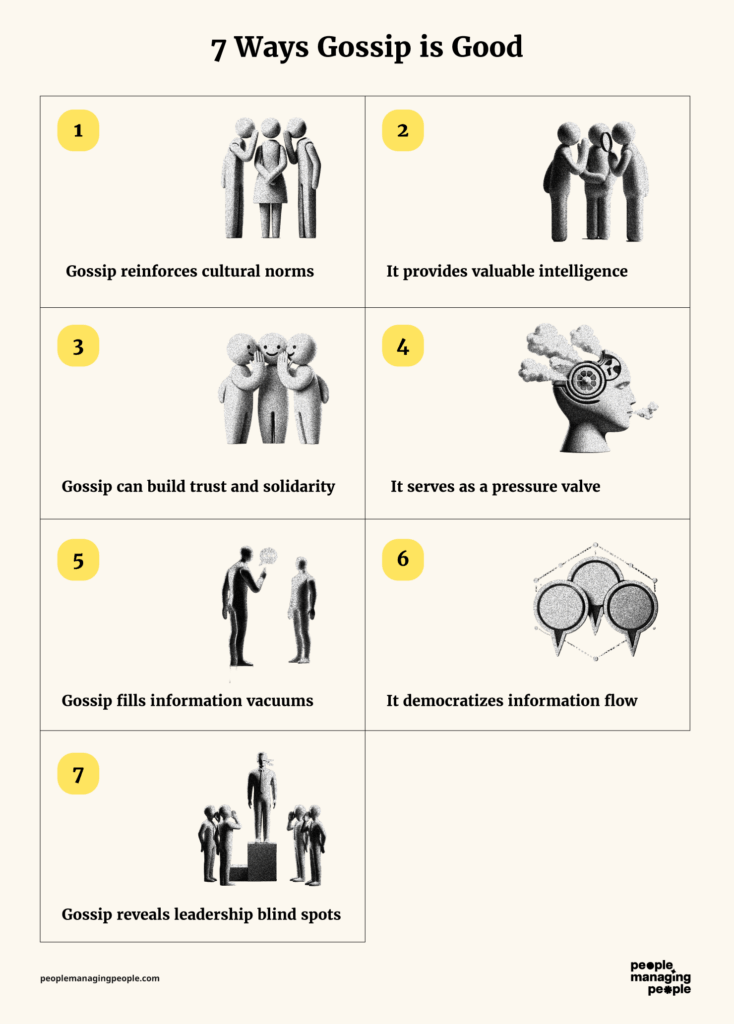Gossip isn't always toxic—sometimes it's culture in motion.
When we hear the word "gossip" in a workplace context, most of us immediately think of something negative: whispered conversations by the water cooler, rumors spreading like wildfire through Slack channels, or the uncomfortable feeling that you're being talked about behind your back.
Traditional management wisdom has long held that gossip is a destructive force that should be eliminated from healthy organizational cultures.
But what if that conventional wisdom is wrong? Research in anthropology, psychology, and organizational behavior suggests that gossip—the informal sharing of information—serves critical social functions.
Rather than viewing workplace gossip as uniformly toxic, forward-thinking leaders are beginning to understand the nuanced role that informal information networks play in organizational dynamics.
“They’re quick, honest, and emotionally intelligent,” says Jillian Yuhas, communication expert and author of Boundary Badass. "Formal communication channels move at a slow and steady pace due to the approval process or greater number of people involved. Informal communication, on the other hand, tells you what’s happening in real time, how people really feel, and what’s bubbling beneath the surface."
So with a bit of appreciation for gossip in mind, here are seven ways it can actually benefit leadership and workplace culture when properly understood and channeled.
7 Ways Gossip is Good

1. Gossip reinforces cultural norms
When employees talk about colleagues who violate workplace norms—whether it's the person who consistently shows up late to meetings or the manager who takes credit for others' work—they're actually helping to strengthen and enforce those cultural standards. These conversations signal what behaviors are considered acceptable and which ones aren't.
Smart leaders recognize that these informal discussions help new employees understand the unwritten rules of the organization much faster than any employee handbook could. When managed well, gossip becomes a mechanism for cultural transmission rather than a destructive force.
2. It provides valuable intelligence
Leaders who completely shut themselves off from informal information networks miss critical insights about what's actually happening in their organizations. The gossip grapevine often surfaces issues—tensions between departments, concerns about new policies, or brewing discontent—long before they appear in formal feedback channels.
By keeping appropriate lines of communication open with their teams, leaders can gain access to early warning signals about potential problems. The key is distinguishing between malicious rumors and genuinely useful information about organizational dynamics.
“If a leader taps into those internal communication networks with curiosity, not control, they gain access to the pulse of their people,” Yuhas said. “It’s an early-warning sign for conflict, burnout, and even opportunity. Also, informal communication can help leaders stay grounded in the human reality of their teams, yet build genuine connections where team members feel safe to share what’s on their minds and voice their ideas and solutions that support productivity.”
3. Gossip can build trust and solidarity
Sharing personal information—even something as simple as "Did you hear that Mark's daughter got into Harvard?"—helps build social bonds between colleagues. These seemingly trivial exchanges create trust networks that can later facilitate better teamwork and collaboration.
Research shows that teams that engage in moderate levels of harmless social gossip often report higher levels of cohesion and psychological safety than teams where personal sharing is discouraged.
The emotional connections formed through these interactions make people more invested in both their colleagues and the organization.
4. It serves as a pressure valve
Organizations are complex social environments filled with frustrations, power dynamics, and personality clashes. Completely suppressing discussion of these realities often backfires.
Allowing for controlled venting through relatively harmless gossip can provide an important pressure release that prevents more serious conflict.
Instead of driving gossip underground, wise leaders create appropriate spaces for employees to process their workplace experiences, while setting clear boundaries around destructive forms of talk.
“Rather than trying to eliminate gossip, leaders can create space for open dialogue, psychological safety, and genuine feedback,” Yuhas said. “When people feel heard, the need to vent decreases as they feel valued within the company. And if something does spiral into harmful gossip, it’s usually a sign of a deeper trust or communication issue.”
5. Gossip fills information vacuums
When formal communication channels fail, informal ones will inevitably take their place. During periods of organizational change or uncertainty, gossip networks work overtime to make sense of limited information—for better or worse.
Savvy leaders recognize this dynamic and leverage it constructively. By ensuring key information ambassadors have accurate information, they can help the informal network spread correct rather than speculative information. The gossip network then becomes an ally in change management rather than an obstacle.
The word gossip itself makes people flinch, but the truth is, it’s part of how humans make sense of what’s going on. It’s how people process things, especially in places where they feel they can’t speak up directly. It often fills the space that leadership leaves empty. Those real conversations happening in that space expose the gap between what leadership thinks is happening and what actually is.
6. It democratizes information flow
In hierarchical organizations, gossip often serves as an equalizing force that helps information flow across formal power structures. Junior employees who might never interact with senior leadership can gain insights through informal networks that help them better understand organizational context.
While formal communication channels tend to move information up and down the org chart, gossip networks often connect people across departments and levels, creating valuable cross-functional awareness that wouldn't otherwise exist.
7. Gossip reveals leadership blind spots
Perhaps most valuably, the topics that dominate workplace gossip often highlight exactly what formal systems are failing to address.
If employees are constantly gossiping about unfair promotion practices, work-life balance issues, or problematic leadership behaviors, that's vital information for anyone trying to build a healthy culture.
Instead of shooting the messenger, effective leaders recognize gossip as a symptom that points to underlying issues requiring attention. The content of workplace gossip can serve as a powerful diagnostic tool for cultural health.
Why Good Gossip Goes Bad
None of this is to suggest that all workplace gossip is beneficial. Malicious rumors, character assassination, and spreading false information remain deeply problematic.
“When gossip becomes about tearing people down, spreading misinformation, or passive-aggressively avoiding accountability, that’s when it starts to harm trust,” Carter said. And that’s not a gossip problem—that’s a leadership and culture problem.”
It can also be revealing of who just isn’t going to work within the organization’s culture and may need to be moved on.
“If it’s people actively trying to hurt others, sabotage decisions, or stir drama, that’s not “just gossip”—that’s a toxic behavior issue,” Carter said. “And you deal with it like any other behavior that undermines the team. You confront it. You talk directly to the person and yeah, if someone’s consistently hurting others, and they won’t stop, sometimes you have to let them go. Culture isn’t just about being nice—it’s about protecting what matters."
Moving Beyond Gossip Being Taboo
By recognizing the social and organizational functions that gossip serves, leaders can take a more nuanced and empathetic approach to engagement.
Rather than futilely attempting to eliminate gossip entirely, successful organizations establish clear norms that distinguish between harmful gossip and constructive information sharing. They create cultures where critical issues surfaced through informal channels can be brought into more productive formal discussions.
“This is where the temperature of the culture is really felt,” Carter said. “If you’re leading a team or a company, and you’re smart, you’ll listen to that. Not to spy, not to control it—but to understand what’s being left unsaid as well as what’s said. That’s the stuff you can’t afford to miss.”
In the end, gossip isn't inherently good or bad—it's an inevitable aspect of human social organization.
The question isn't whether gossip will exist in your workplace, but whether you'll understand and channel it effectively. Smart leaders recognize that sometimes, those water cooler conversations might be the most honest measure of what's really happening with your people.
What's Next?
Keep up with all the latest development in people management and organizational development by subscribing to the People Managing People newsletter. You'll get all the latest trends, analysis and expert commentary straight to your inbox.


